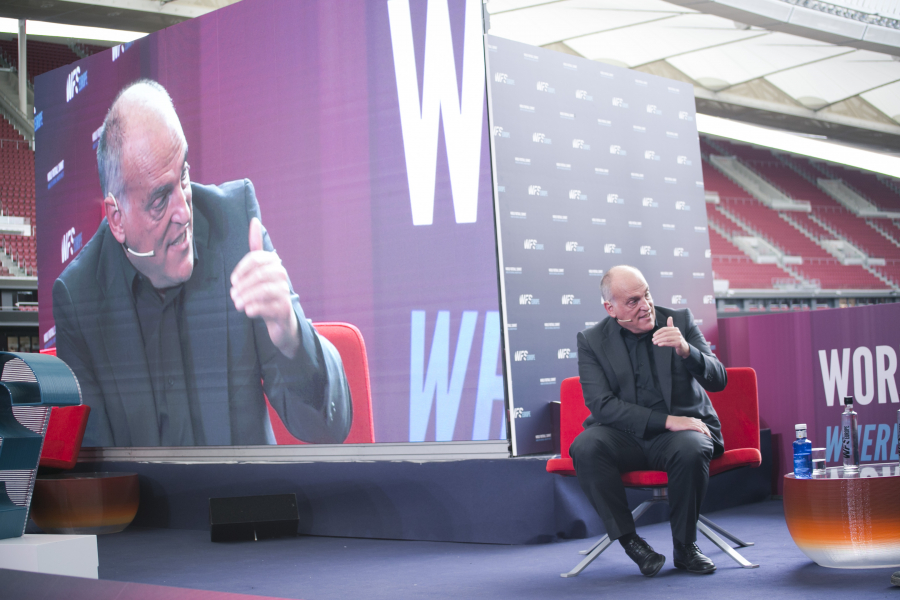
- LaLiga president Javier Tebas explained at World Football Summit Europe that he expects several bids, especially after the removal of a three-year limit.
- The growth of OTT streaming services could see new kinds of audiovisual rights packages put on sale.
The rights to broadcast professional football in Spain from the 2022/23 season will go on the market soon and LaLiga president Javier Tebas expects this tender process will be different. LaLiga’s plan to offer different kinds of packages, along with the growth of the OTT market and the removal of three-year limits on such domestic deals, could bring about change.
Speaking in a Q&A at World Football Summit Europe 2021, Tebas went into detail to answer some of the questions about LaLiga’s plans for selling its rights. “LaLiga cannot be passive in this marketplace’s new landscape,” the president told the audience at the event, held at Atlético Madrid’s Wanda Metropolitano Stadium. “We must have the correct distribution. We have to do something different and disruptive.”
Tebas explained that LaLiga will offer various packages, meaning some matches could be shown on traditional channels and others on streaming services. He said: “There is such advancement in OTT. Some parts of the rights packages could go to normal TV and some to OTT, as we could divide packages up. We’re looking at various possibilities. We’re giving many options to attract more interest.”
In any case, Tebas is pleased with a change to Spanish law that will allow LaLiga to ink longer-term deals that provide greater stability. The president explained: “There was a law in Spain that limited national rights deals to three-year terms, but we negotiated during the Pactos de Viana talks and this no longer applies. Now, it’s EU law that applies. I can affirm here, with complete certainty, that if the tender were only three years then there would be just one party interested, but with four or five years we’ll have more.”
Optimising LaLiga’s international rights packages
The sale of the domestic rights for Spanish football will be a major focus over the coming months. Fortunately, LaLiga already has peace of mind when it comes to the international rights because of the strategic decision to not sell all packages at the same time, greatly reducing risk.
In the words of Tebas: “One of the international rights strategies that has worked for us is that we don’t – unlike the Italian, French and German leagues – say ‘let’s do every country at once’ when international a contracts expire. Every year we have 10 or so countries where we’ll have a tender and we don’t do all the tenders at the same time. We do one in January, February, March and so on. So, we can work little by little and ensure we optimise the value of the rights. We have many contracts around the world and, for the next four years, we have our rights sold in most international markets at a good price with 13 percent growth.”
Since Tebas became LaLiga president in 2013, internationalisation has been an important cornerstone of LaLiga projects. “Our success isn’t luck, it comes thanks to the work of everyone we have and the great internationalisation team we have,” Tebas said.
Investment in Spanish football thanks to the CVC agreement
During his appearance at WFS Europe 2021, Tebas also asked about LaLiga’s agreement with CVC. Headline after headline has been written about the financial aspects of this collaboration, but Tebas pointed out that there’s more to the deal than that.
He stated: “People think it’s an operation solely for financing, but it’s not. With this operation, we’re not mortgaging the rights of any clubs. With this operation, CVC assume risk.”
Tebas continued: “CVC aren’t looking to lose money, obviously, as they want to make money. But the better it goes for CVC, the better it goes for us. We calculate that the 10% of results that are for CVC will be compensated for with the growth we’ll have in six years. In the next 10 or 15 years, we’ll grow another approximately 30%. You have to go out and find support, capital and strategic partners to grow.”
The more than €2bn that this agreement is set to bring to Spanish professional clubs will allow teams to make crucial investments for the future, especially since there is a limit on how much of the money can be used for player transfers or wages.
Tebas added: “Only 15% of the money can go towards players, so 85% is for each club to make investments. We need to improve stadiums. We need to improve digitally.”
Criticism of the rush to change football’s formats
Discussing the failed European Super League project during the Q&A, Tebas was critical of the rush to come up with new formats for competitions that might be struggling. “When football has a problem or a headache, the response from some is ‘oh, let’s change the format or create a new competition’,” he pointed out.
Continuing, the LaLiga president said: “There’s a lot that can be done to fix the football industry before, for example, creating a World Cup every two years or reducing the number of teams in a competition. There are non-negotiable things. A Club World Cup every year is non-negotiable. A national team World Cup every two years is non-negotiable. A bigger change to the Champions League format than the one they’ve done just now is non-negotiable.”
Criticising the motivations for the Super League proposal, which he described as being “like Robin Hood but backwards, stealing from the poor to give to the rich”, Tebas concluded that football’s governing bodies and leading institutions need to understand the social responsibility they have, given how many families rely on the sport’s ecosystem to earn an income.
